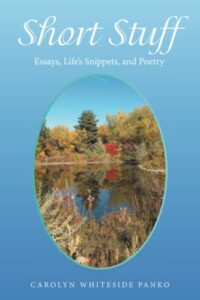Title: Short Stuff: Essays, Life’s Snippets and Poetry
Author: Carolyn Whiteside Panko
Publisher: XlibrisUS
ISBN: 978-1669815105
Pages: 45
Genre: Autobiography
Reviewed By: Dan MacIntosh
Pacific Book Review
The “Snippets” part of the title to Carolyn Whiteside Panko’s book, Short Stuff: Essays, Life’s Snippets and Poetry, is the best descriptor of this short, forty-five-page work. Most of its pieces are short and revolve around Panko’s most significant memories. Although not arranged in strict chronological order, these reflections nevertheless begin with Panko’s earliest memories, dating back to the ‘40s, and then conclude in the early 2000s. Most all these recollections concern family members and family matters. As the latter pieces are from Panko’s perspective as a grandmother, it is clear that Panko’s life legacy is at the forefront of her mind. Although it hasn’t always been easy, one is left with the lasting impression that Panko has lived a good life.
The first few writings focus on social justice issues. You might say Panko and her family were social justice warriors, before that term even came into vogue. One essay is called “Sit-ins in Dallas, Texas 1950-1961,” which is followed by “The Last Days of the Poll Tax.” These early days of the Civil Rights Movement are extremely significant in the America’s evolution, and it must have been exciting to be a part of it all.
The book’s few poetry inclusions come from 1989 and reveal Panko’s more philosophical side. Rather than write about the people in her life, as her essays mostly do, “Reflection 1,” for instance, takes a spiritual approach to understanding the events and people in her life.
The book concludes with essays that mostly cover Panko’s parents. One is left believing she had a closer relationship to her father, than her mother. For instance, Panko fondly recalls some of the loving things her father used to say to her, but the same cannot be said about the conversations she had with her mother. She says at one point that her mother tried to drive a wedge in her relationship with her son by using verbal jabs. Panko doesn’t go so far as to try and analyze why she had trouble getting along with her mom. Instead, she mostly just lets circumstances speak for themselves.
Carolyn Whiteside Panko’s book is not meant to be a full autobiography, even though it is autobiographical in nature. Instead, it’s more of a collection of memories, all gathered together in one place. With it, you do get a generalized picture of Panko’s life up until now, without going into great detail about each and every year she’s lived. You might say it all adds up to a selective biography, of sorts. Each memory was significant, one presumes, for Panko to take the time to write about it. We sometimes say, whenever we’ve forgotten what we were going to say, that it must not have been very important, anyway. Similarly, what Panko has written about in this book is important because she remembers these events and was moved enough to put down her thoughts about them.
Then again, maybe Panko doesn’t really feel the need to write a full book about her life. Rather, she just felt the urge to put to paper some of her life’s most important events so that someone might also relate to them and learn from them. There may have been a therapeutic aspect to the creation of this book. It could have helped Panko to write out some of her memories as a way to better focus and understand them. Whatever the case, Panko writes both well and honestly. She thinks deeply about what she has been through during her lifetime, and skillfully shares these thoughts in her book.


